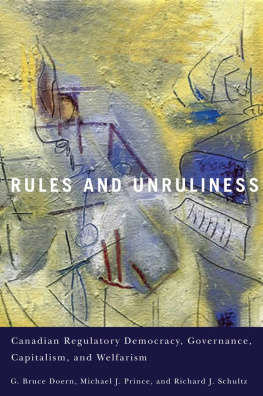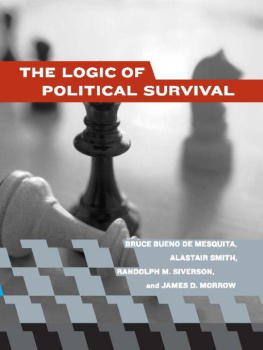

Table of Contents
Title Page
Dedication
Epigraph
Introduction
Chapter 1 - The Rules of Politics
Three Political Dimensions
Virtues of 3 - D Politics
Change the Size of Dimensions and Change the World
Rules Ruling Rulers
Taxing
Shuffling the Essential Deck
Do the Rules Work in Democracies?
Chapter 2 - Coming to Power
Paths to Power with Few Essentials
Speed Is Essential
Pay to Play
Mortality: The Best Opportunity for Power
Inheritance and the Problem of Relatives
Papal Bull - ying for Power
Seizing Power from the Bankrupt
Silence Is Golden
Institutional Change
Coming to Power in Democracy
Democratic Inheritance
Democracy Is an Arms Race for Good Ideas
Coalition Dynamics
A Last Word on Coming to Power: The Ultimate Fate of Sergeant Doe
Chapter 3 - Staying in Power
Governance in Pursuit of Heads
The Perils of Meritocracy
Keep Essentials Off-Balance
Democrats Arent Angels
Bloc Voting
Leader Survival
Chapter 4 - Steal from the Poor, Give to the Rich
Taxation
Tax Collectors
Privatized Tax Collection
Extraction
Borrowing
Debt Forgiveness
Chapter 5 - Getting and Spending
Effective Policy Need Not Be Civic Minded
Bailouts and Coalition Size
Is Democracy a Luxury?
Public Goods Not for the Publics Good
Who Doesnt Love a Cute Baby?
Clean Drinking Water
Building Infrastructure
Public Goods for the Public Good
Earthquakes and Governance
Chapter 6 - If Corruption Empowers, Then Absolute Corruption Empowers Absolutely
Power and Corruption
Private Goods in Democracies
Private Goods in Small Coalition Settings
Wall Street: Small Coalitions at Work
Dealing with Good Deed Doers
Cautionary Tales: Never Take the Coalition for Granted
Discretionary Money
Chapter 7 - Foreign Aid
The Political Logic of Aid
The Impact of Aid
An Assessment of Foreign Aid
Aid Shakedowns
Fixing Aid Policy
Nation Building
Chapter 8 - The People in Revolt
To Protest or Not To Protest
Nipping Mass Movements in the Bud
Protest in Democracy and Autocracy
Shocks Raise Revolts
Are Disasters Always Disasters for Government Survival?
Responding to Revolution or Its Threat
Power to the People
Chapter 9 - War, Peace, and World Order
War Fighting
To Try Hard or Not
Fighting for Survival
Who Survives War
The Peace Between Democracies
Defending the Peace and Nation Building
Chapter 10 - What Is To Be Done?
Rules to Fix By
Lessons from Green Bay
Fixing Democracies
Removing Misery
Free and Fair Elections: False Hope
Acknowledgments
Notes
Index
Copyright Page
To our dictators, who have treated us so well
Arlene and Fiona
What is important here is cash. [A] leader needs money, gold and diamonds to run his hundred castles, feed his thousand women, buy cars for the millions of boot-lickers under his heels, reinforce the loyal military forces and still have enough change left to deposit into his numbered Swiss accounts.
MOBUTU SESE SEKO OF ZAIRE, PROBABLY APOCRYPHAL
Men at some time are masters of their fates. The fault, dear Brutus, is not in our stars, but in ourselves, that we are underlings.
WILLIAM SHAKESPEARE, Julius Caesar (I, II, 140-141)
Introduction
Rules to Rule By
What remarkable puzzles politics provides. Every days headlines shock and surprise us. Daily we hear of frauds, chicanery, and double-dealing by corporate executives, new lies, thefts, cruelties and even murders perpetrated by government leaders. We cannot help but wonder what flaws of culture, religion, upbringing, or historical circumstance explain the rise of these malevolent despots, greedy Wall Street bankers, and unctuous oil barons. Is it true, as Shakespeares Cassius said, that the fault lies not in the stars but in ourselves? Or, more particularly, in those who lead us? Most of us are content to believe that. And yet the truth is far different.
Too often we accept the accounts of historians, journalists, pundits, and poets without probing beneath the surface to discover deeper truths that point neither to the stars nor to ourselves. The world of politics is dictated by rules. Short is the term of any ruler foolish enough to govern without submitting to these rules to rule by.
Journalists, authors, and academics have endeavored to explain politics through storytelling. Theyll explore why this or that leader seized power, or how the population of a far-flung country came to revolt against their government, or why a specific policy enacted last year has reversed the fortunes of millions of lives. And in the explanations of these cases, a journalist or historian can usually tell us what happened, and to whom, and maybe even why. But beneath the particulars of the many political stories and histories we read are a few questions that seem to emerge time after time, some profound, some seemingly minor, but all nagging and enduring in the back of our minds: How do tyrants hold on to power for so long? For that matter, why is the tenure of successful democratic leaders so brief? How can countries with such misguided and corrupt economic policies survive for so long? Why are countries that are prone to natural disasters so often unprepared when they happen? And how can lands rich with natural resources at the same time support populations stricken with poverty?
Equally, we may well wonder: Why are Wall Street executives so politically tone-deaf that they dole out billions in bonuses while plunging the global economy into recession? Why is the leadership of a corporation, on whose shoulders so much responsibility rests, decided by so few people? Why are failed CEOs retained and paid handsomely even as their companys shareholders lose their shirts?
In one form or another, these questions of political behavior pop up again and again. Each explanation, each story, treats the errant leader and his or her faulty decision making as a one-off, one-of-a-kind situation. But there is nothing unique about political behavior.
These stories of the horrible things politicians or business executives do are appealing in their own perverse way because they free us to believe we would behave differently if given the opportunity. They liberate us to cast blame on the flawed person who somehow, inexplicably, had the authority to make monumentaland monumentally baddecisions. We are confident that we would never act like Libyas Muammar Qaddafi who bombed his own people to keep himself in power. We look at the huge losses suffered under Kenneth Lays leadership by Enrons employees, retirees, and shareholders and think we arent like Kenneth Lay. We look at each case and conclude they are different, uncharacteristic anomalies. Yet they are held together by the logic of politics, the rules ruling rulers.
The pundits of politics and the nabobs of news have left us ignorant of these rules. They are content to blame the doers of evil without inquiring why the worlds of politics and business seem to succor miscreants or to turn good people into scoundrels. Thats why we are still asking the same old questions. Were still surprised by the prevalence of drought-induced food shortages in Africa, 3,500 years after the pharaohs worked out how to store grain. Were still shocked by the devastation of earthquakes and tsunamis in places like Haiti, Iran, Myanmar, and Sri Lanka, and by the seemingly lesser intensity of such natural disasters in North America and Europe. Were still troubled by the friendly handshakes and winks exchanged between democratic leaders and the tyrants that they somehow justify empowering.
Next page











